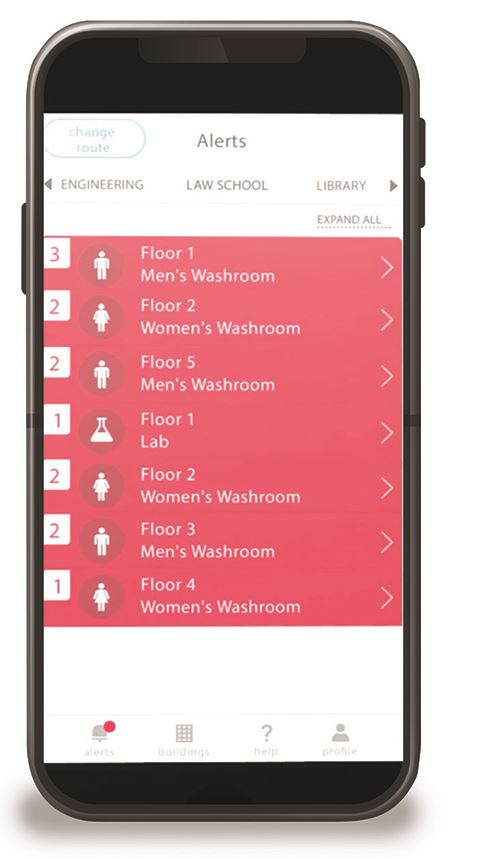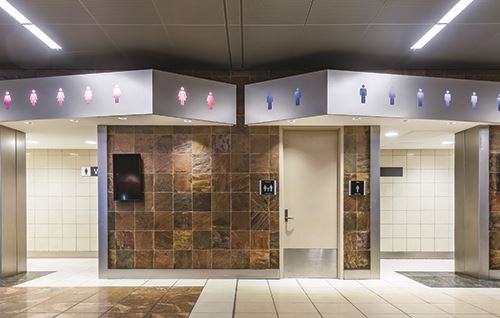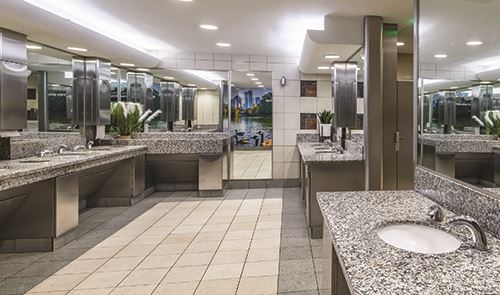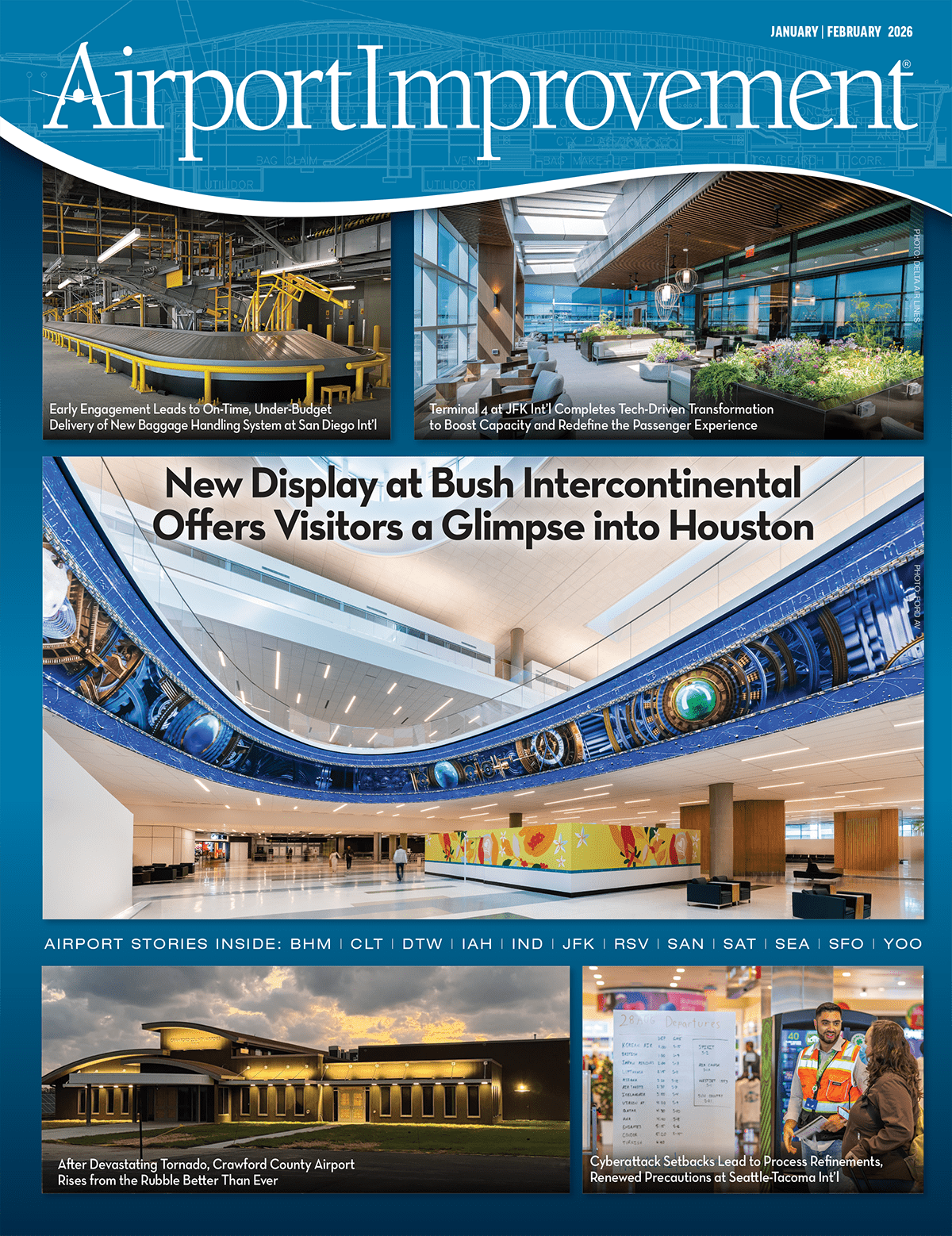First it was smartphones and smart TVs, then smart cars and watches. What’s next, smart restrooms? In a word, yes. And Hartsfield-Jackson Atlanta International Airport (ATL) has them. Last summer, ATL became the first facility in the world with a fully connected smart restroom.
First it was smartphones and smart TVs, then smart cars and watches. What’s next, smart restrooms? In a word, yes. And Hartsfield-Jackson Atlanta International Airport (ATL) has them.
Last summer, ATL became the first facility in the world with a fully connected smart restroom. All of its fixtures—toilets, faucets, paper towel and soap dispensers, toilet paper holders, etc.—wirelessly transmit condition and usage reports to maintenance staff. The real-time information allows custodians to keep the facilities clean, fully stocked with supplies and in proper working order when needed rather than on a pre-determined time interval.
The proprietary high-tech system debuted in parts of Concourse B in June 2018, and has since been implemented throughout the concourse. The boarding level restroooms on Concourse E also have smart towel and tissue dispensers. Maintenance workers now receive timely updates about more than 800 various restroom dispensers and fixtures.
|
Project: Smart Restroom Management System Location: Hartsfield-Jackson Atlanta Int’l Airport Facility Operator: Atlanta Airlines Terminal Co. To-Date Project Costs: $265,000 in a phased trial deployment 2020 Budget: $950,000 for airport-wide deployment System Debut: June 2018 (Concourse B restrooms equipped with smart towel & tissue dispensers) Deployment to Date (Feb. 2020): 4 women’s restrooms, 4 men’s, one family are fully IoT-enabled in Concourse B, Concourse E has IoT-enabled towel and tissue dispensers in the boarding level restrooms Affected Dispensers and Fixtures: 108 toilets; 48 urinals; 66 faucets; 314 tissue dispensers; 117 hand sanitizer dispensers; 187 towel dispensers System: KOLO™ Smart Monitoring System Provider: GP PRO, a division of Georgia-Pacific LLC Associated Products: enMotion® & Compact® paper towel, toilet tissue & sanitizer dispensers by GP PRO; TOTO EcoPower® flush valves & faucets Exterior Capacity Signage: Infax Stall Occupancy Indicators: Tooshlights® by Modus Systems Customer Satisfaction Survey Kiosks: Avius Key Benefits: Enhanced customer experience; decreased water use & paper waste; increased timeliness for cleaning & repairs; labor efficiencies |
By the end of this year, that number is expected to nearly double, as smart technology is added to all restrooms in ATL’s Domestic Terminal and on concourses A and B. Some restrooms on concourses C, D and E also scheduled for upgrades.
Atlanta Airlines Terminal Company (AATC), the airline-owned firm that manages all 7.2 million square feet of ATL’s airside and landside facilities, spearheaded and executed the tech-forward project. As of February, the company had spent $265,000 in trial deployment, and project stakeholders were continuing to validate associated data, evaluate the technology’s effect on the passenger experience and assess its return on investment. The budget for an airport-wide deployment this fiscal year is $950,000.
AATC President and Chief Executive Officer Kofi Smith, Ph.D., links the tech additions to improving the passenger experience. While completing his Doctorate of Business Administration at Georgia State University, Smith took a deep dive into the delicate relationship between restroom cleanliness and customer satisfaction.
In his role at ATL, he inherently knew that restrooms were a major factor in affecting the passenger experience at the world’s busiest airport. But he dissected and analyzed that assumption while writing his doctoral dissertation.
“I started doing research, and restrooms are the No. 1 most important characteristic of an airport to business travelers, and the second most important aspect to the leisure travelers,” Smith notes, summarizing 2015-2017 J.D. Power data used in his thesis.
“If you create a delightful experience, passengers will spend 45% more when they return to your airport, and a delighted traveler will spend 190% more than a dissatisfied passenger.”
With clear ties between concessions revenue and traveler satisfaction—particularly passengers’ experience with restrooms—Smith embarked on his academic and operational mission to improve ATL’s loos.
“I took all of these little dots in my head, connected them and wrote a dissertation on improving and enhancing the passenger experience in the restroom,” he explains.
 Smith’s dissertation not only earned him an advanced degree, it also inspired a string of improvements and state-of-the-art advancements to ATL’s restrooms that are ongoing. His goal: provide passengers with a truly “delightful” experience in ATL’s highly trafficked restrooms.
Smith’s dissertation not only earned him an advanced degree, it also inspired a string of improvements and state-of-the-art advancements to ATL’s restrooms that are ongoing. His goal: provide passengers with a truly “delightful” experience in ATL’s highly trafficked restrooms.
Initial changes, such as updating the music and addressing unpleasant odors, were relatively minor and inexpensive but provided noticeable improvements for customers. Other early tweaks were more environmentally driven, such as switching discolored painted vents to stainless steel, and replacing incandescent and fluorescent lighting with LEDs.
But Smith felt it was important for ATL’s restrooms to become “smart” and wirelessly connected. This core objective led to a key partnership with Georgia-Pacific for a broad-based, high-tech restroom management solution.
Ginger Lange, Ph.D., (one of Smith’s cohorts from Georgia State) figured prominently into the change. As Georgia-Pacific’s Senior Director of Smart Restrooms, Lange convinced Smith that Georgia-Pacific had the technology and wherewithal to help ATL improve its restroom maintenance—and also provide the delightful customer experience Smith sought.

Delightfully Smart
The subsequent collaboration between the two doctoral candidates and their respective Atlanta-based companies yielded a significant development: the first commercial restroom that fully leverages integration provided by the internet of
things (IoT).
The commercial product that transpired is the KOLO™ Smart Monitoring System, from GP PRO, a division of Georgia-Pacific. It uses advanced sensors and cloud technology to transmit information from restroom fixtures to custodians via a mobile app. The system also integrates information from traffic management and customer feedback devices.
Importantly, the KOLO system works with select third-party fixtures as well as GP PRO products such as towel, toilet tissue, and soap or hand sanitizer dispensers. For instance, it receives valuable data from TOTO EcoPower® flush valves and faucets about usage, malfunctions, outages and leaks. When an anomaly is detected, staff is alerted in real time so problems can be addressed immediately.
 “Airports are recognizing the importance of the restroom in the overall passenger experience, and Kofi [Smith] knew it was very important for restrooms to become connected and smart—meaning that the devices and dispensers in the restrooms had to become connected and smart,” says Mike Slawson, vice president and general manager of the Smart Restrooms business for GP PRO.
“Airports are recognizing the importance of the restroom in the overall passenger experience, and Kofi [Smith] knew it was very important for restrooms to become connected and smart—meaning that the devices and dispensers in the restrooms had to become connected and smart,” says Mike Slawson, vice president and general manager of the Smart Restrooms business for GP PRO.
The results from trials in Concourse B have been impressive. Slawson reports that product outages (toilet tissue, paper towel, hand sanitizer, etc.) dropped 51% from June 2018 to December 2019 when the KOLO system was first installed. Moreover, 88% of custodians surveyed in Concourse B feel that the system is making them more efficient.
Delightfully Sustainable & Safe
From an environmental standpoint, the system is helping the airport save paper and water.
Slawson reports that tissue waste fell 40% during the Concourse B test period. Less tissue is thrown away when rolls can be changed based on usage rather than shift-based intervals.
“We are learning so much more about water consumption by fixture, by bathroom, and by concourse through our connected sensor faucets and flush valves,” says Bhavik Patel, director of Business Strategy for TOTO USA.
After measuring its water footprint, ATL has reduced overall consumption year over year. Patel reports that Concourse B is saving nearly $5,000 per month in water costs since 48 low-flush urinals were installed in October 2019. The new fixtures reduce water consumption from half a gallon to 1 pint per flush.
 There are also associated benefits for risk mitigation. When plumbing failures or leaks can be detected in real-time, staff can prevent property damage or fall risks associated with water overflow.
There are also associated benefits for risk mitigation. When plumbing failures or leaks can be detected in real-time, staff can prevent property damage or fall risks associated with water overflow.
Patel notes that impending maintenance issues can be flagged proactively, for attention by the night shift when customer traffic decreases. “Just being able to remotely monitor and manage your facility is one of the best outcomes,” he adds.
Like Smith, Patel highlights the opportunities to enhance customer service. “We know our faucets and flush valves are working, so the user experience should be better—and we are seeing that,” says Patel.
New Customer Conveniences
Passengers have been particularly impressed by stall indicators within the B-23 restrooms that display if stalls are available. Inside the restrooms, indicators supplied by Modus Systems eliminate the need for passengers to crouch and look for feet to determine if an individual stall is occupied.
Avius survey kiosks are posted outside the restrooms to capture passengers’ feedback regarding their experience. Early results show more exceptional ratings on Concourse B, which has KOLO technology, than on Concourse A, where it hasn’t been deployed. Both are Delta concourses with similar-sized restrooms and passenger volumes. Satisfaction increased among males and females, but males at a higher margin.
Even more striking is the impact on towel outages. On average, female restrooms on Concourse B have 68.8% less complaints about towels running out than restrooms on Concourse A over the same time period. Male restrooms generated 27% less complaints as well.
Concourse B restrooms are consistently rated among the best maintained in the industry, but any negative feedback provided by passengers immediately passes through the KOLO System to the custodian’s mobile device. Custodians respond quickly to these feedback alerts, keeping one complaint from turning into 10 or 20 or more.

“In the janitorial services industry, there’s typically an emphasis either on elevating the experience of restroom users or in gaining labor efficiencies and reducing cost. Those two goals are both extremely important at airports,” says GP PRO’s Slawson. “Hartsfield-Jackson Atlanta, being the busiest airport in the world, has tremendous throughput in their restrooms. But at the same time, they’ve also recognized the importance of giving passengers an elevated passenger experience.”
Together, the restroom enhancements and technology installations create an overall more positive experience for passengers traveling through the bustling facility.





